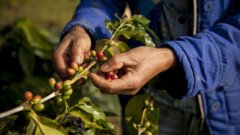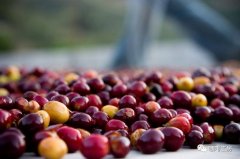About 'what is the quality of Yunnan small-grain coffee?' The essence of the answer

For professional baristas, please follow the coffee workshop (Wechat official account cafe_style)
A little knowledge of the fields. Yunnan small grain coffee, that is, Yunnan Arabica coffee, now belongs to an awkward position in the international market as well as in China. For example, coffee shops rank low in individual coffee, and the cheapest coffee is Yunnan coffee. This is an issue that can not be avoided. Since the landlord asked you what is the difference between the main producing areas and the main producing areas, tell the story of the varieties. Yunnan can be said to be the only province that still grows Arabica on a large scale, mainly in Dehong Lincang, Baoshan, western Yunnan, and Pu'er Banna in southern Yunnan. The coffee introduced by missionaries in the 19th century was mainly Robusta, and then it was no longer planted on a large scale. Experts assisted by the Soviet Union brought the planting techniques of two mainstream Arabica varieties in the world: typica and Bourbon bourbon to Baoshan, Yunnan, for cultivation and promotion, which were well received. Later, due to the special period, scientific research and cultivation tended to stagnate. After the reform and opening up, thanks to the efforts of local agricultural experts, the iron pickup varieties cultivated by Baoshan state-run Lujiang Farm and Xincheng Youth Farm also won the first place in the international coffee competition. There is a flood of praise, but because of the Chinese people's understanding of coffee, we do not increase our interest in growing much. Since the early 1990s, in order to improve the enthusiasm of farmers, Baoshan Rezuo has introduced a Katim variety bred by the Portuguese Coffee Rust Research Center with Timor (medium grain, Tim) and Caturra (small grain, Kaddura), and has been popularized and planted with numerous titles. This variety has solved many factors such as disease and insect disasters and drought resistance, and the important thing is that the yield per mu has nearly doubled. Although it has increased the enthusiasm of farmers to grow coffee, it has also become the reason for the low quality of Yunnan coffee from now on. At the same time, Nestl é and Maxwell entered China and began to promote coffee varieties suitable for instant coffee in Pu'er and other places: S288, natural hybrid of large seed and small seed and S26 of kent hybrid of Arabica Kent in India, which had first-class rust resistance, but the planting difficulty and adaptability were low, and the cultivation was basically stopped at the beginning of this century. Speaking of which, I think there should be some judgment on the varieties of coffee in Yunnan. What about the excellent iron pickup and bourbon before? In the new promotion and planting, there are still many hills left to continue to grow old varieties of coffee, but, generally speaking, backward places do not have the protection of origin and a single species, a mountain, 10 families, all kinds of people, a gust of wind blowing, pollen flying all over the sky. He he. The problem of variety, so that Yunnan coffee really lost in the starting line. In addition, although the environmental problems of coffee cultivation can meet the standards of hot areas, they are far away from the equator, evaporation, large-scale coffee cultivation in Yunnan is less than 1100m above sea level, the severe drought in Yunnan in recent years, and the frost period in the producing areas, and so on, all make the cultivation of coffee can not be guaranteed normally, directly affecting the quality of coffee production. As for other processing problems, not to mention the quality of farmers, tea farmers have been drinking tea for generations, but farmers may not have had coffee in their lives. Say so much, but it doesn't mean that you haven't had a cup of good Yunnan coffee, and if the post-processing and roasting is good, as a friend here said, the coffee from several hills, such as Pu'erman Laojiang, Kaddura of Manzhong Tian, Tielinka of Baihualing of Lujiang, Baoshan, and Boben of Lujiang, Baoshan, are still good, especially resistant to the old varieties at an altitude of 1800m. If there's anything, we'll communicate again.
The gorgeous dividing line did not open Zhihu for a few days, and suddenly found that many friends saw it. Well, after taking a look at everyone's questions, according to my existing knowledge and a little practical experience, I can only spread out the question, saying, in the front, although the respondent likes coffee, he knows more about coffee in planting and primary processing, but deep processing, such as baking and blending, is not as good as many newcomers now, but he has a favorite standard of individual products, and the taste is difficult to tune. (maybe you can talk about the difference between Starbucks green tea bitches and real coffee lovers.) I would like to add below that if it is helpful, you are welcome to adopt it. Coffee is mainly used as a beverage, and is known as "the three largest beverages in the world" together with tea and cocoa. Among the three beverages, its output, output value and consumption all rank first among the three beverage crops. Say a word of nonsense and continue to read below. 1, Nestle, max and other brands of coffee into China, they have done the biggest thing, is to let all Chinese people know, what is coffee? The reason is very simple, a "delicious". So, whether you know coffee now or not, or know how to mix coffee or wait for coffee or Barabara. Since the 1990s, they have promoted the cultivation of coffee in China, and their coffee recognition and sales have doubled every year (let's understand one thing, it takes a process to tell the good from the bad. We are now in the latter process), which is enough to show how much influence they have on Chinese coffee. Without textual research on the materials seen in the early years, I think everyone before the post-90s should have a deep understanding. However, to us at that time, coffee was just coffee powder and instant coffee, 3 in 1. 2. Instant coffee. I won't dwell on several problems in the fast-selling world: instant formulations, similar to other fast-consuming products, such as milk tea, cereal, etc., evoke the taste buds of customers as the sole goal, drink without saying that the memory is unforgettable, but plus other factors, we will choose again, all powder, and finally countless recipes and processes in the later stage. Also, since it is coffee, there must be the only coffee: the unique aroma of coffee and the role of caffeine in coffee, refreshing or refreshing, a hundred-fold perpetual motion machine, elevated blood pressure and a faster heartbeat. So the question is 3. Where does the unique aroma of coffee come from and where does caffeine come from? Take a small-grain coffee in Yunnan, that is Arabica coffee, as an example. With the adjustment of scientific research personnel and the continuous cooperation of farmers in recent years, the following table is given for your reference:
What is the quality of Yunnan small grain coffee?
Caffeine, which is what we call caffeine. Caffeine has many effects, which will be described later. Here, I just want to say that Vietnam, the champion producing area of instant coffee, and Robusta, a coffee variety grown in Hainan in the early days, contain 1.5-2.5 times more caffeine than Arabica coffee.
Important Notice :
前街咖啡 FrontStreet Coffee has moved to new addredd:
FrontStreet Coffee Address: 315,Donghua East Road,GuangZhou
Tel:020 38364473
- Prev

The output and quality of Yunnan small grain coffee are growing simultaneously, attracting international buyers.
Professional baristas Please follow the Coffee Workshop (Wechat official account cafe_style) over the past 10 years, the output of Yunnan small-grain coffee has been growing steadily, the quality stability has been continuously improved, and has begun to be recognized by global roasters. Colombian coffee bean production has recently declined due to leaf rust, which has boosted China's coffee bean exports. Volcafe, a well-known multinational coffee trader, set up in Yunnan.
- Next

What's the difference between Yunnan coffee? What are the characteristics of small coffee?
Professional baristas Please follow the Coffee Workshop (Wechat official account cafe_style) Yunnan small grain coffee is relative to Vietnam's medium grain coffee, which is due to different varieties. The varieties grown in Yunnan are Arabica species, whose granules are smaller than those of Robusta coffee grown in Vietnam, so they are called small grains. As far as climatic conditions are concerned, the sunshine in southern Yunnan is long.
Related
- Detailed explanation of Jadeite planting Land in Panamanian Jadeite Manor introduction to the grading system of Jadeite competitive bidding, Red bid, Green bid and Rose Summer
- Story of Coffee planting in Brenka region of Costa Rica Stonehenge Manor anaerobic heavy honey treatment of flavor mouth
- What's on the barrel of Blue Mountain Coffee beans?
- Can American coffee also pull flowers? How to use hot American style to pull out a good-looking pattern?
- Can you make a cold extract with coffee beans? What is the right proportion for cold-extracted coffee formula?
- Indonesian PWN Gold Mandrine Coffee Origin Features Flavor How to Chong? Mandolin coffee is American.
- A brief introduction to the flavor characteristics of Brazilian yellow bourbon coffee beans
- What is the effect of different water quality on the flavor of cold-extracted coffee? What kind of water is best for brewing coffee?
- Why do you think of Rose Summer whenever you mention Panamanian coffee?
- Introduction to the characteristics of authentic blue mountain coffee bean producing areas? What is the CIB Coffee Authority in Jamaica?

